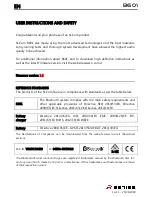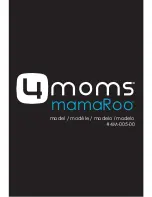
1. Whenever the awning is wet while rolled up, as soon
as conditions allow, roll it out and let it dry before
rolling it up again.
2. Mildew does not form on the fabric itself, but on the
accumulated dust, dirt and grime. Periodically clean
vinyl or woven acrylic. Refer to cleaning instructions
below for fabric care.
3. Always make sure the awning is extended high
enough before opening the entry door.
4. Apply silicone spray lubricant as needed to keep the
awning’s moving parts operating smoothly. For ease
of operation on hardware, rub candle was on all slid-
ing surfaces.
5. 8500 and SUNCHASER:
a. Abrasion, weather and long hours in the sun
are vinyl’s worst enemies. To avoid these problems,
you will need to keep your awning fabric clean. Use
a mixture of 1/4 cup dish soap, 1/4 cup bleach and
five gallons of fresh water. Soap the open awning
with this mixture, then roll it up and let stand for five
minutes. Rolling up of the awning will apply the mix-
ture to the underside of the fabric. Unroll the awning
and hose off the top and bottom with clean water.
Repeat if necessary and allow to completely dry.
C
CARE AND USE
6
SUNCHASER, 8500 AND 9000 AWNINg USER gUIDE
6. 9000 :
a. In addition to its beauty and soft translucence,
woven acrylic fabric offers the advantages of strength
and breathable. It is water repellent; but because it is a
woven cloth, it is not water proof. To keep your acrylic
awning clean, simply hose it off occasionally and let it
dry. Do Not Scrub.
b. Avoid touching the underside of the 9000
canopy when it is wet. To do so will break the surface
tension of the water and encourage seepage through
the fabric.
c. Because woven acrylic is of a much lighter
weight than vinyl, shifting may occur if the awning and
pull strap are not centrally aligned with the fabric roller
tube while the awning is being rolled up. If necessary,
roll the awning out and adjust the alignment.
7. When To Get More Help:
a. If malfunctions occur that cannot be corrected by
reviewing this user’s guide, contact a qualified Dometic
service technician.
Note: A slight “travel line” may appear where the door roller
contacts the awning fabric. This is considered normal and
does not affect the integrity of the awning.
























